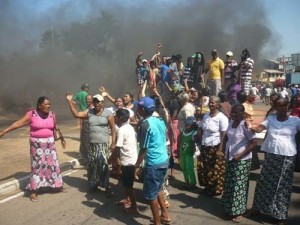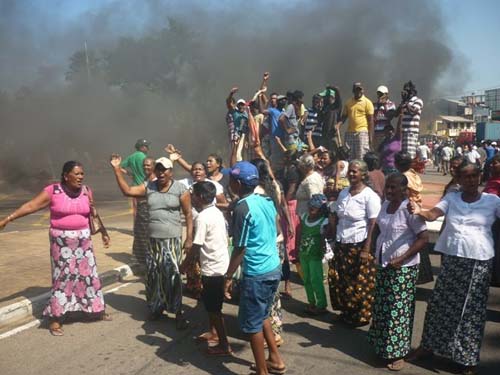 |
| protesting fisherflok |
D.B.S. Jeyaraj
38 year old Warnakulasooriya Anthony Fernand, a father of two children, was killed and eight others critically injured in Chilaw on February 15th when Security personnel opened fire on fisherfolk stridently protesting the sharp rise in fuel prices announced by the Government of President Rajapaksa.
The gunfire was preceded by the widespread use of tear gas to disperse large crowds of affected fisherfolk comprising men, women and children demonstrating against the fuel price increase.
The firing of tear gas as well as live bullets was reportedly undertaken by a Special Task Force (STF) contingent of anti-riot personnel deployed in Chilaw. North –Western Range Deputy Inspector-General (DIG) of Police Pujitha Jayasundera was at the trouble spot overseeing security arrangements.
The crackdown came in the wake of escalating protests by affected fisherfolk along the North – Western coastal areas after a fuel price was announced.
Police claimed that agitated mobs of protestors had attempted to obstruct traffic along the Chilaw-Colombo road and Puttalam – Colombo road with vehicles and by burning tires and putting up road blocks.
Law enforcement authorities were compelled to resort to drastic action when the volatile demonstrators posed a threat to public security by attempting to march into the heart of Chilaw town and engage in violence, said a Police official.
Police said when tear gas canisters were fired at the demonstrators to disperse them, mobs had gone on the rampage throwing stones and Molotov cocktails at the Police.
Security personnel fired in the air first to scare off the mob but were forced to open fire as there was threat of an imminent attack upon them directly, it was claimed.
Representatives of fisher unions involved in the protest refuted Police claims saying the crowds were dispersing rapidly after tear gas was fired when Police and Army opened fire without any undue provocation.
“After tear gas was fired, people were running here and there coughing and with tears in their eyes. No body was trying to attack the cops or soldiers. They just fired indiscrimately at people” said an eye witness.
Injured persons could not be taken by road for medical treatment due to fear of security personnel and had to be taken by boat across Chilaw lagoon to hospital. It is alleged that three of the critically injured are in serious condition while around 25 – 30 persons sustained minor injuries.
The protests had been going on for two days as about 5,000 demonstrators mainly from the Thalavai and Kallady areas of Chilaw were engaged in demonstrations.
Police and Army were called in after negotiations between Chilaw Municipal authorities and fisher union representatives broke down. Attempts by a deputy minister of the Govt to diffuse the crisis also failed.
Initially demonstrators had blocked the Chilaw-Colombo road but later withdrew as Police and Army were called in. Later they blocked off the Puttalam-Colombo road.
Police said the protest has now been quelled and that transport in Chilaw was going on unhindered.
The fisherfolk started protesting after the sudden increase of fuel prices. Protest demonstrations were held in Mannar, Kalpitiya, Marawila ,Negombo and Chilaw from Monday February 13th.
Police dispersed protestors in Negombo on Tuesday February 14th by firing tear gas.
However the Chilaw protest was the most vibrant one necessitating harsh counter measures said official sources.
When protestors resisted the Police the Govt called in the Army to deal with “public disturbances affecting law and order”. A STF squad was also deployed.
On Saturday February 11th , the government increased petrol, diesel and kerosene prices by Rupees Twelve,Thirty –one and Thirty-five respectively.This action amounting to an 8%, 37% and 50% percent increase respectively,delivered a major blow to the living standards of ordinary people, especially the lowest-paid workers.
Persons engaged in fisheries for livelihood were particularly affected.Being relatively better organized through fisher unions and sections of the Catholic clergy the aggrieved fisherfolk engaged in sustained demonstrations protesting the price rise.
Herman Kumara, National Convener of the National Fisheries Solidarity Movement has in a statement explained the predicament faced by fishers thus-
“About 70 to 80 litres of kerosene is needed for one day for a single boat fixed with an outboard engine. With kerosene price increasing by 35 Rupees now the fuel cost will go up for such boats by 2450 rupees daily if the tank is filled to full capacity of 70 litres.Altogether Fishers will have to spend about rupees 9450 for a day because they need to spend a further 980 rupees for lubricants and 447 rupees for 3 litres of petrol for the engine requirements”
Explaining further Kumara has stated–
“For trawlers involved in Multi -day fishing for about 25days in the sea the requirement about 5000 litres of diesel. With the increase of Rupees 31 for a litre of diesel, total cost increases by 155,000 rupees for a trip. This means Fish consumers will have to spend unbearable price for 1Kg of fish with the added cost of ice and land transportation”
The Goverrnment reacting to Fisherr union protests has engaged in some damage control by announcing a fuel subsidy for fishers. The Fisheries and Aquatic Resources Ministry stated that a subsidy of Rs. 12 per litre of diesel and a subsidy of Rs. 25 per litre of kerosene would be granted to those operating fishing craft.
It remains unclear as to whether the fisher unions would be satisfied by the fuel subsidy or whether protests would continue
The Govt has also said a special probe would be conducted into the Chilaw firing to ascertain whether excessive force had been used to suppress the protest.
Meanwhile the World Socialist Web Site(wsws.org) in a special report on the Chilaw incident alleged that the STF fired live bullets on unarmed people without any warning as they marched towards Chilaw town.It also stated that Police prevented the injured from being taken to the hospital.
Here are some relevant excerpts from the WSWS on the spot report –
One fisherman was killed yesterday, and three others were wounded, when police deployed by the Sri Lankan government fired at protesting fishermen at Chilaw-Wella in the country’s north-western province.
Fishermen were protesting for the third day against fuel price increases of up to 50 percent announced by the government on Saturday as part of an International Monetary Fund-imposed austerity package. Fearing more demonstrations, the police imposed a curfew in the area from Wednesday evening to this morning.
Antony Warnakulasuriya, 35, a father of two, died on the spot with a gunshot injury. A bullet had passed through his face, under his nose. Selastian Regan was injured in the chest and transferred to Colombo national hospital in a critical condition. A third protester was injured in one of his knees, and another lost three fingers when he tried to avoid a tear gas canister
After the police and the army had prohibited fishermen from protesting in the town on Tuesday, more than 4,000 people gathered yesterday morning at Chilaw-Wella church. They rejected a meagre price subsidy announced by the government on Tuesday and demanded the withdrawal of the price increases.
Catholic priests tried to stop the fishermen from protesting, saying they were in discussions with the government about securing an 80 percent subsidy. Fishermen shouted that all such pledges by the government in the past had proved to be bogus.
Once the fishermen started a march, walking about 500 metres toward Chilaw town, police fired tear gas and special police force (STF) officers fired with live bullets without any warning. The police would not let the injured be taken to hospital, forcing people to evacuate them in boats via a nearby lagoon.
Tensions are running high in Chilaw-Wella. About 15,000 fishermen and family members gathered there last night after hearing of Warnakulasuriya’s death. Priests stepped in, however, pleading with them not to march to the town. The government sent more police, STF and army contingents to Chilaw. By last night, the town and surrounding area looked like a war zone.
Earlier, police tried to take Warnakulasuriya’s body to Colombo but people refused to allow this. Facing opposition, the provincial council fisheries minister, Sanath Nishantha, had to withdraw from the hospital.
The police shooting was a calculated attack, ordered by President Mahinda Rajapakse’s government. It was intended to send the message that the government will not tolerate any opposition to the implementation of the IMF-dictated measures.
The raising of diesel and kerosene prices by 37 and 50 percent will devastate poorer sections of the population, including fishermen, who use improvised mechanised boats for fishing.
Speaking to WSWS reporters, one of Warnakulasuriya’s relatives said: “It is the government that has ordered the police to shoot. We launched the agitation peacefully. The police forces fired while stretched out on the ground, as in a war.” He condemned the government. “They increased the prices of fuel and do these crimes against us. We have a right to agitate. We should not allow this kind of criminal act.”
The relative said Warnakulauriya’s wife had left for Saudi Arabia to seek work only last month because the family could not earn a living from fishing. “Their children are going to school. Who will look after them?” he asked.
Thousands of fishermen and their families have protested during the past three days, particularly across the country’s north-western coastal belt, demanding the withdrawal of the price hikes. As the protests spread to some areas in the south, the government sought to deflect the anger by announcing a subsidy of 12 rupees (10 US cents) for diesel and 25 rupees for kerosene, even though the increases were 31 and 35 rupees respectively. The government is notorious for breaking such pledges, however.
A WSWS reporting team visited several areas in the north-west to speak to protesting fishing families. A fisherman’s wife at Mahawewa said: “The government promises on subsidies are false. They might give us something and then later cut it all. What we need is the reduction of the prices of fuel and other goods. High prices for fuel mean higher prices for all other goods.”
She explained that because of the lack of refrigeration facilities, most fishermen were forced to sell their catches for a pittance. Because of unaffordable fuel prices, some fishermen had already shifted to unpowered boats.
“Without modern facilities you can’t do this job,” she said. “However, there is no government scheme to provide those facilities for us. We survive on the aid of fisheries associations and SEDEC (a church-controlled welfare organisation). I owe 250,000 rupees ($US2,090) for a loan I got from SEDEC.”
Another fisherman commented: “When there was war, the government promised to give us relief after concluding it. Where is that relief? We were promised we could fish anywhere in the sea after the war. Now we are prohibited even go to Kalpitya [a nearby fishing area]. That area is being developed as a ‘tourist paradise’.”
TC
